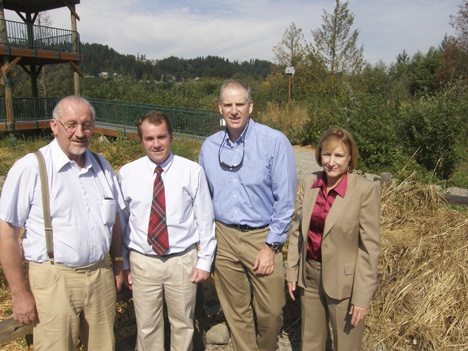Tired of his daily commute to Redmond, the youngest son of Auburn City Councilwoman Sue Singer mentioned to his mother last spring that the planning document “Auburn Vision 2016” didn’t mention any jobs in the future for someone like him.
So the councilwoman took a fresh look at an economic development idea long shelved for lack of money — bringing in green-related development and jobs to the green zone around the 86-acre Auburn Environmental Park between West Main and 15th Street Northwest.
With all the federal stimulus money about, why not apply for some and see what happens, Singer asked herself? But she went light years beyond the original concept, envisioning a project that would link several clean-tech incubators in the Puget Sound region and finally connect private sector green collar businesses to a research university to help grow jobs.
Singer took advantage of the extensive contacts she had established locally and around the world as chairperson of the Puget Sound Regional Council. And she brought her idea to City Councilman Rich Wagner, a retired Weyerhaeuser engineer.
“Rich said, ‘Well, have I got a deal for you,'” Singer recalled. He looked at the sprawling wetlands and saw an ideal outdoor laboratory, a place to test new ideas, a magnet for engineering and science students eager to conduct urban storm water research. He told his friends Mike Woolcot, director of WSU’s Institute for Sustainable Design (ISD), and David McClean, Chairman of WSU’s Civil Engineering and Environmental Department about the idea.
Today the science and business sides are moving forward.
This week the first group of WSU civil engineering students was due to arrive.
One of WSU’s projects will focus on new technologies for roadways. Students will tear up and rebuild a small bit of the Western Avenue pavement with permeable concrete to see how it performs.
“Instead of just hard surfaces where water runs off and collects in the side ditches and goes to a settling pond or some other treatment center, this new technology would allow water to go through and actually get treated at the location and go back down into the ground without being collected,” McLean said on a recent visit to the Environmental Park. “There’s some really neat, real-world pieces that are incorporated into this particular project in terms of the water management issues, and we think we have some expertise that is going to contribute toward tackling some of the problems.”
Woolcot said the idea is unique not only in Washington State but possibly across the nation.
“It’s difficult to study and do sustainability while you are sitting in a university,” Woolcot said. “One of the reasons why this is a landmark deal is our integral involvement in the community in an explicit way. These are not wetlands tucked off to the side of the city’s development area, these are smack in the middle of Auburn. That is unique in the state.”
“Solutions developed here really have an opportunity to become national examples, and engineering-wise they will help business meet tough new regulations all over the United States,” said Wagner.
The City has entered into a contract with the Tacoma-based William Factory Small Business Incubator to manage the clean-tech incubator, possibly as a nonprofit. The City also is making inquiries about the availability of the two-story building at the southern end of Western Avenue, possibly to turn it into the incubator building, which would be called Auburn Scientific Center for Emerging New Technologies or ASCENT. It would include office space for WSU’s Institute of Sustainable Design within walking distance of the Transit Station and commuter rail.
Incubator services typically include: professional mentors, daily management and assistant support, expert consulting services, hands-on training to each business client, a plan center for public and private contracts, referrals for small business loans and bonds, Internet-Web site design and IT assistance.
“The building may or may not be available,” said Auburn Mayor Pete Lewis.
Singer said a variety of public and private sector organizations and companies have agreed to partner on the incubator project and will work together to obtain funding, among them the City of Tacoma, the Auburn School District, Green River Community College, UW Tacoma, the Veterans Conservation Corps, New Energy Solutions, Miles Sand and Gravel, Parametrix Engineering, Weyerhaeuser and Syntrix Bio Systems.
The City will apply for $8 million in federal money to launch the incubator project. Singer said the reaction to the idea from the state’s congressional delegation, including Norm Dicks and Jay Inslee’s office, has been very positive.
“Without federal funding, it won’t happen,” Singer said.
Auburn-based 3-Phase Energy Systems, which takes exhaust from its manufacturing process and turns it into electricity, is a promising entrepreneur who has talked with the City about moving to the green zone.
Potential nonprofit partners include the Auburn Area Chamber of Commerce, the Small Business Assistance Center and AccelleratorWA-Auburn, Potential partners include Puget Sound Energy.
“We also want to educate and help the public,” Singer said. “We want to have a place where we could send Puget Sound Energy customers so they can see demonstration projects and what the latest and greatest is, what could save them the most money. Our schools can do field trips, and they’ll be able to find out through research the best way to do things.”
Benefits for Auburn include a new employment center, solutions to storm water problems and low impact development demonstration projects.
“It could provide new higher paying jobs and lower storm water bills for the public,” Wagner said.



